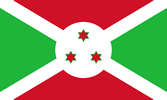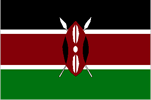 Burundi
Burundi
The religions of Burundi are Christian 67% (Roman Catholic 62%, Protestant 5%), indigenous beliefs 32%, Muslim 1%.
Although the Burundi constitution guarantees religious freedom, several churches have been banned because their doctrines challenged civil authority. In general, churches that challenge the government or call for reforms are harassed. The government does not allow services on weekdays or the display of religious symbols on buildings other than churches.
Burundi is a small, landlocked country in central Africa with an economy dominated by subsistence agriculture. … The country ranks 178th out of 186 counties on the Human Development Index and 90 per cent of the population live on less than US$2 per day.
The majority are nominal Christians with the impact of modernization, Christianity was introduced as a way of ‘civilizing’ the country and opposing Burundi traditions, which is why many people have decided to live a double life posing outwardly as Christians, but maintaining their traditions internally.
There has been a proliferation of churches with all kinds of un-Biblical teaching due to the lack of qualified schools that can train ministers, the Church in Burundi is not founded on doctrine. The people in the churches are Burundian first and Christian second. The voice of the churches is confusing people more than responding to them. Christianity in Burundi is more a part of the problem than the solution.
 Kenya
Kenya
The predominant religion in Kenya is Christianity, which is adhered to by an estimated 84.8% of the total population. Islam is the second largest religion in Kenya, practiced by approximately 9.7 to 11.1 percent of Kenyans. Other faiths practiced in Kenya are Baha’i, Buddhism, Hinduism and traditional religions.
Today, the main Christian denominations in Kenya are Protestant confessions, which make up about 47.4% of the country’s religious composition.
Kenya is a safe country for missionaries, and there are many foreign missionaries serving in Kenya safely. However, as a missionary, you will need to take precautions and follow a few safety rules to ensure that you and your fellow missionaries are safe.
Kenya’s economy is heavily dependent on agriculture. 75% of Kenyans make their living from farming, producing both for local consumption and for export. Though its population is high in proportion to its area, Kenya is counted among Africa countries whose food production has kept pace with its population growth.
 Rwanda
Rwanda
Christianity is the largest religion in Rwanda. 43.7% of Rwanda’s population is Roman Catholic, 37.7% is Protestant, 11.8% is Seventh-day Adventist, 2.0% is Muslim (mainly Sunni), 2.5% claims no religious affiliation, and 0.7% is Jehovah’s Witness.
Rwanda has emerged as a model for economic development. The country has taken great strides just 25 years since its horrific genocide. … It also has extensive internet infrastructure, which covers over 95% of the country. And of course, Rwanda also continues to record impressive economic growth
Agriculture is the main economic activity in Rwanda with 70% of the population engaged in the sector, and around 72% of the working population employed in agriculture. … Rwanda exports dry beans, potatoes, maize, rice, cassava flour, maize flour, poultry and live animals within Eastern Africa.
Despite Rwanda being about 90 percent Christian at the time, neighbors killed neighbors and Christians killed Christians in some of the most horrific ways imaginable.
Rwanda to most people and they think of it as a highly dangerous place. However, it’s actually one of the safest countries in East Africa to travel in today. Serious crime or hostility aimed specifically at travelers is very rare, and there’s no more to worry about here than in most other countries.
A new Rwandan “preacher” law was passed in September of 2018 which gives existing preachers five years to earn an associate degree in religion.
Rwandan genocide revealed the failure of evangelization in Africa. It is the sad reality of a continent profoundly spiritual and religious in form but often far from Jesus Christ in the concrete reality of daily life.
 South Sudan
South Sudan
6.010 million Christians (60.46%), 3.270 million followers of African Traditional Religion (32.9%), 610,000 Muslims (6.2%) and 50,000 unaffiliated (no known religion) of a total 9,940,000 people. The majority of South Sudanese are Christian, alongside significant numbers of Muslims and animists and other traditional folk religion practitioners.
Agriculture in South Sudan largely remains at subsistence level with average field sizes of two acres per household, crop yields being very low: hardly one ton per acre due to use of poor quality seeds, tools and agronomic practices. The same applies to the livestock and fisheries sectors.
The economy of South Sudan is one of the world’s weakest and most underdeveloped. South Sudan has little existing infrastructure and has the highest maternal mortality and female illiteracy rates in the world as of 2011. South Sudan is one of the poorest countries in the world.
South Sudan is poor. In 2015, the extreme poverty rate increased to 66 percent. Only 27 percent of the population is literate, with an enormous gender gap: the literacy rate for males is 40 percent while the literacy rate for females is 16 percent. … Poor roads make the country impassable during the rainy season.
 Tanzania
Tanzania
Christianity is the largest religion in Tanzania according to the most recent estimates 61% of the population are Christian, 35% are Muslim, 2% practice traditional religions and 1% are unaffiliated.
Despite growth resulting from gold production and tourism, Tanzania remains one of the most impoverished countries in the world. Approximately 36 percent of Tanzanians live below the poverty line. … One out of every three Tanzanians is self-employed, indicating a high level of microenterprise activity.
Agriculture is the main part of Tanzania’s economy, 70 percent of the poor population live in rural areas, and almost all of them are involved in the farming sector.
Tanzania is, overall, a safe country to visit. This is even more so if your visit is primarily an organized safari. …. As with many third-world countries, theft and muggings are relatively common, but most incidents are in cities such as Dar es Salaam and Arusha. Walking alone around the city is not recommended.
 Uganda
Uganda
Uganda is a religiously diverse nation with Christianity being the most widely professed religion. According to the 2014 census, over 84 percent of the population was Christian while about 14 percent of the population adhered to Islam, making it the largest minority religion.
Uganda is a landlocked and fertile country with many lakes and rivers. Some 83% of the population live in rural areas and rely on subsistence agriculture.
Uganda is generally poor, economically speaking but they are rich by other standards. They do not smoke or have major drug problems. Most crimes are petty ones. The climate is wonderful, although climate chance is problematic.
Almost one-quarter of Uganda’s GDP comes from agriculture. The area is known for its tea, tobacco, and cotton production. Uganda is a landlocked country that is made up of savannas, mountains, and lakes. The endangered mountain gorilla resides in the Ruwenzori Mountains of Uganda.
Uganda is generally viewed as a safe, secure and politically stable country within the region, its extensive and porous borders are inadequately policed, allowing for a robust flow of illicit trade and immigration.